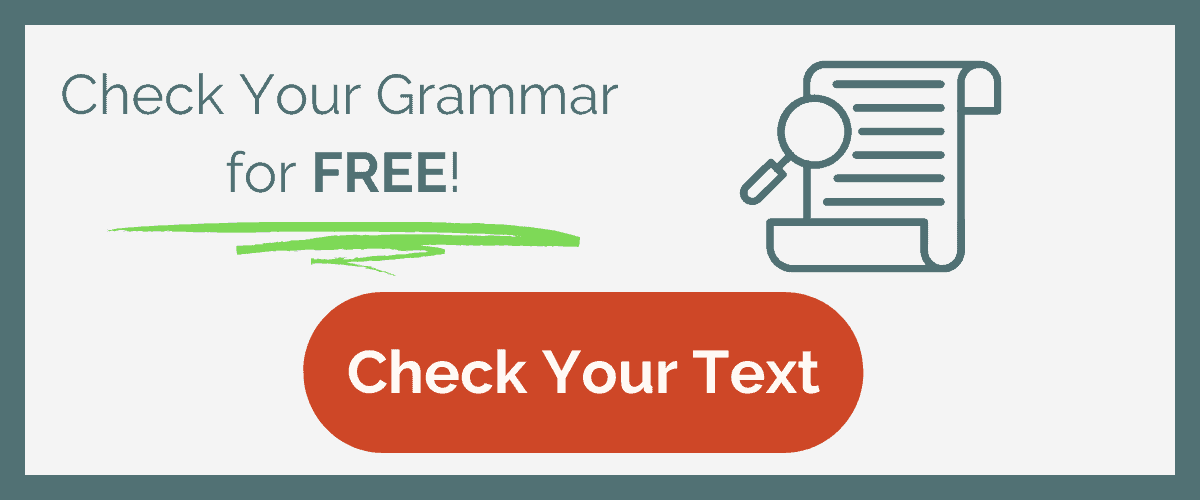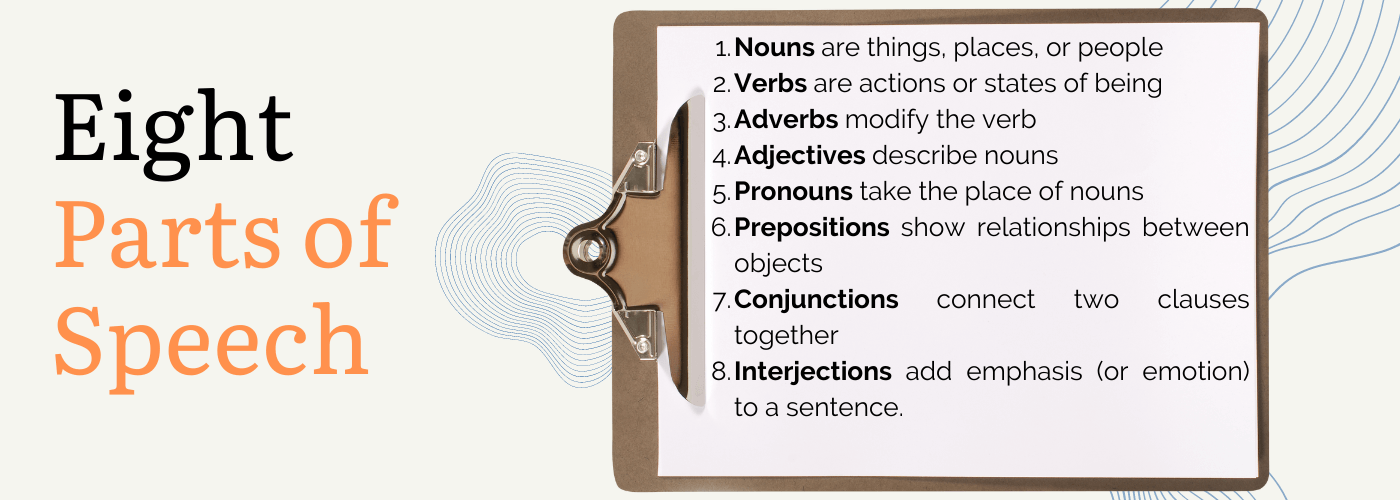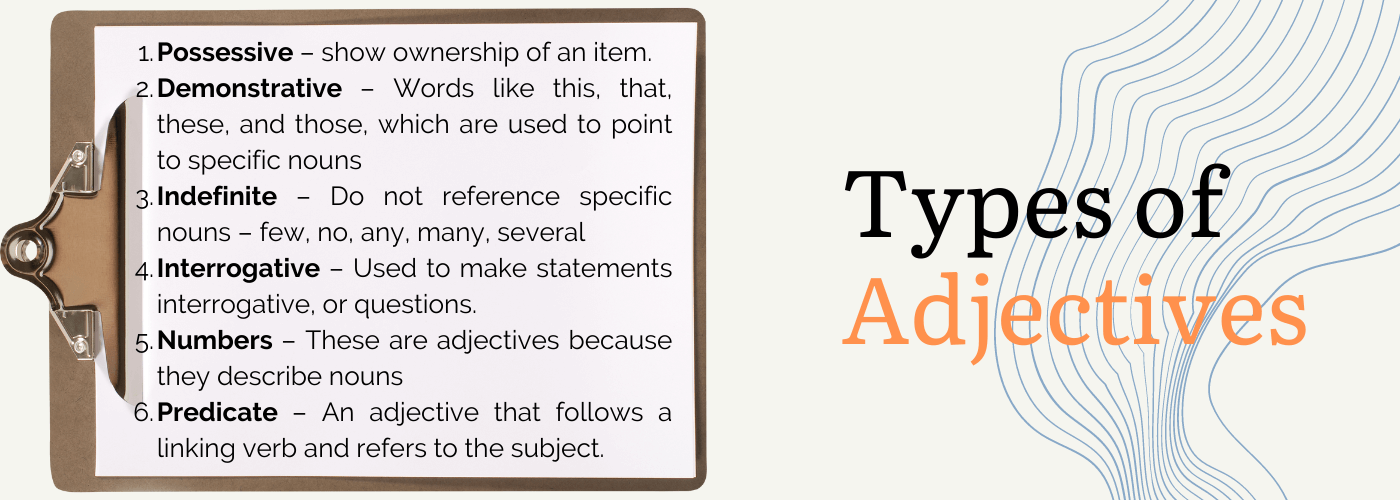If you want to be a successful writer, you need to understand the eight parts of speech. These are the basics of grammar that you need to know in order to create well-written sentences and paragraphs. The eight parts of speech are nouns, pronouns, verbs, adjectives, adverbs, prepositions, conjunctions, and interjections. In this article, we’ll explore each one in more detail and give you some tips on how to use them correctly.

What Are The Eight Parts Of Speech

1) Nouns
Nouns & plural nouns are one of the key building blocks of language. They’re so important that without them, we wouldn’t be able to communicate effectively. So what exactly are nouns?
- Simply put, nouns are people, places, or things.
That might seem like a pretty broad definition, but it covers just about everything you can think of.
For example, “dog” and “house” are both nouns.
So are “Mrs. Smith” and “New York City.“
Even abstract concepts like “justice” and “love” are considered nouns.
As you can see, there’s no shortage of things that can be classified as nouns. The words annalists & even ware are both nouns! The next time you’re trying to figure out what a word is, ask yourself if it’s a person, place, or thing. Chances are good that it’s a noun!
Nouns – Words used to represent a person, place, direct object, or idea. Examples: Cat, mountain, boy, Fred, scissors, freedom
Proper Nouns – A specific name for a particular person, place, or thing
2) Pronouns
Pronouns are words that substitute for nouns or are assigned by someone.
- In simpler terms, pronouns assigned to people, animals, and things take the place of a noun in a sentence.
For example, the word “I” is a pronoun that takes the place of the speaker. The word “you” is a pronoun that takes the place of the person being spoken to.
Here are some other examples of pronouns:
- he, she, it
- them
- their
- these
- those
Pronouns, like her & I or She & I, can be used in both writing and speaking. When you use pronouns correctly, it can make your writing sound more professional. Pronouns can also make your writing shorter and easier to read.
For example, instead of saying “The teacher is going to give the students their homework” you can say “The teacher is going to give them their homework“.
There are many types of pronouns. Some nouns even change depending on the gender of their pronouns like blond & blonde! Here are the most common pronouns.
- Possessive pronouns.
- Personal pronouns.
- Relative pronouns.
- Reflexive pronouns.
- Indefinite pronouns.
- Demonstrative pronouns.
- Interrogative pronouns.
- Intensive pronouns
Pronoun – Words that are used in place of a noun: I, me, he, him, she, her, it, we, us, they, them, and you. Example: Instead of John went to the store, He went to the store. He replaces John, meaning that he is a pronoun.
3) Verbs
Verbs are often described as “action words,” but they can also be used to describe an internal state or an inactive state.
- Essentially, a verb is a word that indicates an action or occurrence.
For example, the verb “run” describes the action of running, and the verb “be” can be used to describe existence. Vivid Verbs can also be used to express likelihood or possibility, as in the verb “might.”
In addition, verbs can be used to link one sentence to another, as in the verb “so.” Verbs are quite versatile words!
- Verb Tense – Verbs have tenses, or different forms depending on usage.
- Infinitive – The most basic form, which is used in its to form. This is the verb without changes or endings, such as to swim, to be, to know.
- Past tense – Express that the action happened in the past. Walked, Thought, Was
- Present Tense – Express action happening at the current time. Swims, thinks, is
- Future Tense – Expresses actions that happen in the future. Will swim, is going to be, will think
4) Adjectives
Adjectives are used to make your writing more interesting and accurate.
- Adjectives are words that describe, modify, or intensify a noun or pronoun.
For example, instead of just writing “the big house” you could write “the sprawling Victorian house.” The descriptive adjective modifies or describes the noun phrase.
Adjectives can also be used to compare two things, as in “this sofa is more comfortable than that one.“

- Types of Adjectives
- Possessive – show ownership of an item. Example: My, his, her, its, their, our, your. Also called possessive pronouns because they replace nouns.
- Demonstrative – Words like this, that, these, and those, which are used to point to specific nouns
- Indefinite – Do not reference specific nouns – few, no, any, many, several
- Interrogative – Used to make statements interrogative, or questions. Examples: Which type of bread will you use for your sandwich? What is your favorite movie?
- Numbers – These are adjectives because they describe nouns
- Predicate – An adjective that follows a linking verb and refers to the subject. Example: The cat looks hungry. In this case, the linking verb is looks, and hungry describes the cat, making it a predicate adjective.
5) Adverbs
Adverbs provide additional information about an action, description, or another adverb. However, you have to learn how to use adverbs correctly.
- Adverbs are words that modify verbs, adjectives, or other adverbs.
For example, the word “slowly” is an adverb that modifies the verb “walk.” The word “very” is an adverb that modifies the adjective “nice.” And the word “quickly” is an adverb that modifies the adverb “slowly.”
Here are a few more examples of adverbs in action:
- Jimmy played the piano loudly. (modifies verb)
- He slowly walked to the store. (modifies verb)
- She spoke quietly so as not to wake her sleeping baby. (modifies verb)
- He drove recklessly and got into a lot of accidents. (modifies verb)
Adverbs – Describe or modify verbs or adjectives.
- Examples: She swam quickly. Quickly describes how she swam, so this is an adverb describing a verb.
Conjunctive Adverbs – A conjunctive adverb connects two clauses in a sentence. Basically, it’s like a mini conjunction.
6) Prepositional Phrases
Prepositions – Work with a noun or pronoun to make a prepositional phrase that modifies verbs, nouns, or adjectives.
- Prepositions: aboard, about, above, across, after, against, along, amid, among, around, at, before, behind, below, beneath, beside, between, beyond, by, down, during, except, for, from, in, into, like, near, of, off, on, onto, out, over, past, since, through, throughout, to, toward, under, underneath, until, unto, up, upon, with, within, without.
- Example: The dog walked down the street. Down begins the prepositional phrase “down the street,” which modifies walked.
The purpose of a prepositional phrase is to modify (describe, identify, indicate location for) a noun or pronoun.
Note that you can often leave out a prepositional phrase without changing the meaning of the sentence.
For example, in the sentence “I’m going to school in a car,” the prepositional phrase “in a car” is not essential. You could say simply, “I’m going to school.“
7) Conjunctions
- A conjunction is a word that joins two or more words, phrases, or clauses together.
For example, the conjunction “and” can join two nouns to form a compound noun, as in “sun” and “moon” to form “sunshine.”
The conjunction “but” can be used to contrast two ideas, as in “The sun was shining brightly, but the wind was cold.” There are many different types of conjunctions, each with its own function.
Here are just a few examples:
- And: Used to join two or more items together.
- Example: “I have a cat and a dog.”
- But: Used to contrast two ideas.
- Example: “I like cats but dogs are my favorite.”
- Or: Used either to join two items together or to represent a choice.
- Example: “Do you want tea or coffee?“
Conjunctions – A word that joins two independent clauses. These include and, but, or, nor, for, so, yet.
8) Interjection
- An interjection is a word or phrase that is used to express surprise, excitement, or emotion.
Interjections are typically short and to the point, and they are not grammatically integrated into the rest of the sentence. In other words, they can be thought of as little utterances that we insert into our speech when we feel the need to emphasize something.
Here are some examples of common interjections:
- Wow!
- Oh no!
- Oops!
- Yuck!
- Awww.
Adjectives – Words used to describe or modify nouns or pronouns. Examples: The gray book; the old man; the large one.
Eight Parts of Speech With Examples
- Noun – The relentless commitment of the professional paid off in a successful outcome.
- Verb – I am walking around the block.
- Adjective – She is a very pretty girl.
- Adverb – He carefully crafted his masterpiece with meticulous attention to detail, adroitly demonstrating his mastery of the craft.
- Interjection – Wow! It’s incredible to think about all the amazing possibilities that exist in life.
- Conjunction – Do you want to have pizza or hamburgers for lunch today?
- Prepositional Phrase – The dog ran through the dark woods, barking at animals off in the distance.
- Pronouns – She went to the mall after school.
FAQs – Parts Of Speech
Here are the eight parts of speech:
Noun: a word that names a person, place, thing, or idea
Pronoun: a word that stands for a noun or assigned by someone else
Verb: a word that expresses an action, occurrence, or state of being
Adjective: a word that describes or modifies a noun or pronoun
Adverb: a word that modifies verbs, adjectives, other adverbs, or clauses
Preposition: a word that shows the relationship between two things in space or time
Conjunction: a word that joins together words and phrases
Interjection: an exclamation used to express emotion
The most difficult part of learning the eight parts of speech is knowing which word belongs to which category. That’s why it’s important to practice identifying the different parts of speech as often as possible.
Yesterday can be both a noun and an adverb. As a noun, yesterday refers to the day before today. As an adverb, yesterday means “in or during the past” – so something that happened yesterday was in the past.
Yes, today is an adverb. Adverbs are words that modify verbs, adjectives, and other adverbs. Today can be used as a noun meaning “the present day” or “the present time.”
Yes, “wow” is most definitely an interjection. It’s a word that we use to express amazement, surprise, or bafflement, and it doesn’t really have a grammatical function beyond conveying those emotions
Yes, “wow” can definitely be used as an adjective. It typically means something is exciting or delightful.
The verb “been” is a past participle. This means that it is used to describe an action that took place in the past. For example, you might say “I have been to the mall,” or “I have been working on this project for weeks.” In both cases, the verb “been” is describing something that happened in the past.
Yes, been is the past participle form of the verb ‘be.’ When used as part of a verb phrase, it indicates that something has happened in the past. For example, the sentence ‘I have been to France’ means that at some point in the past, I visited France.
Not can be an adverb, conjunction, interjection, or a noun. As an adverb, it means “not doing” or “not performing”. As a conjunction, it joins phrases or clauses together and usually has the meaning of “nor” or “or”. As an interjection, it is used to express astonishment, joy, etc., and is usually followed by an exclamation mark. Finally, as a noun, it means the negative form of some word or group of words.
So can be used as an adverb, conjunction, pronoun, interjection, or adjective. As an adverb, it means “in that manner”; as a conjunction, it means “therefore”; as a pronoun, it means “that person or thing”; as an interjection, it is used to express surprise or disbelief; and as an adjective, it signifies excellent or very good.
Wow is typically used as an interjection or a noun. When used as an interjection, it shows strong feelings, such as surprise, admiration, or joy. For example, “Wow! You did it!” Alternatively, when used as a noun, wow can refer to something that is impressive or inspiring. For example, “That new car is a real wow.”
Today can be used as both an adverb and a noun. As an adverb, it means “on or in the course of this present day,” as in “I’m going to do some shopping today.” As a noun, it means “the present day,” as in “Today is Monday.”
Together can be used as an adverb, adjective, or noun. Together is most commonly used as an adverb, meaning “in or into one group” or “accompanying one another.” It can also be used as an adjective, meaning “joined together” or “belonging to the same group.” Finally, together can be used as a noun to refer to a sense of unity or companionship.
Outside is an adverb meaning not within or inside. It can also be used as an adjective meaning situated on the outside of something. As a preposition, it means moving or being directed away from what is inside. Lastly, as a noun, it refers to that which is outside or external.
The Bottom Line
The eight parts of speech can be tricky to remember, but with a little practice, you’ll be able to use them like a pro. Remember the following rules when using these parts of speech in your writing:
- Nouns are things, places, or people
- Verbs are actions or states of being
- Adverbs modify the verb
- Adjectives describe nouns
- Pronouns take the place of nouns
- Prepositions show relationships between objects
- Conjunctions connect two clauses together
- Interjections add emphasis (or emotion) to a sentence.
Now that you know the basics, put these rules into practice and watch your writing improve! And if you need some extra help, consider using our rewording a sentence tool to make things easy!
